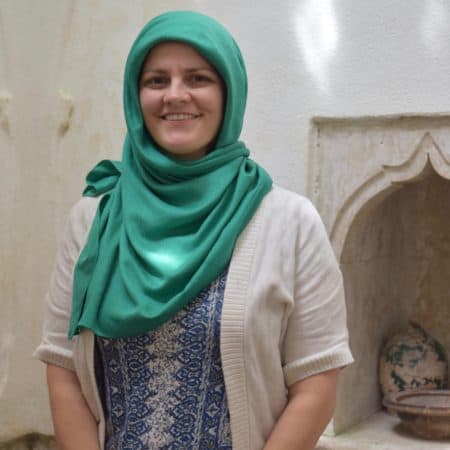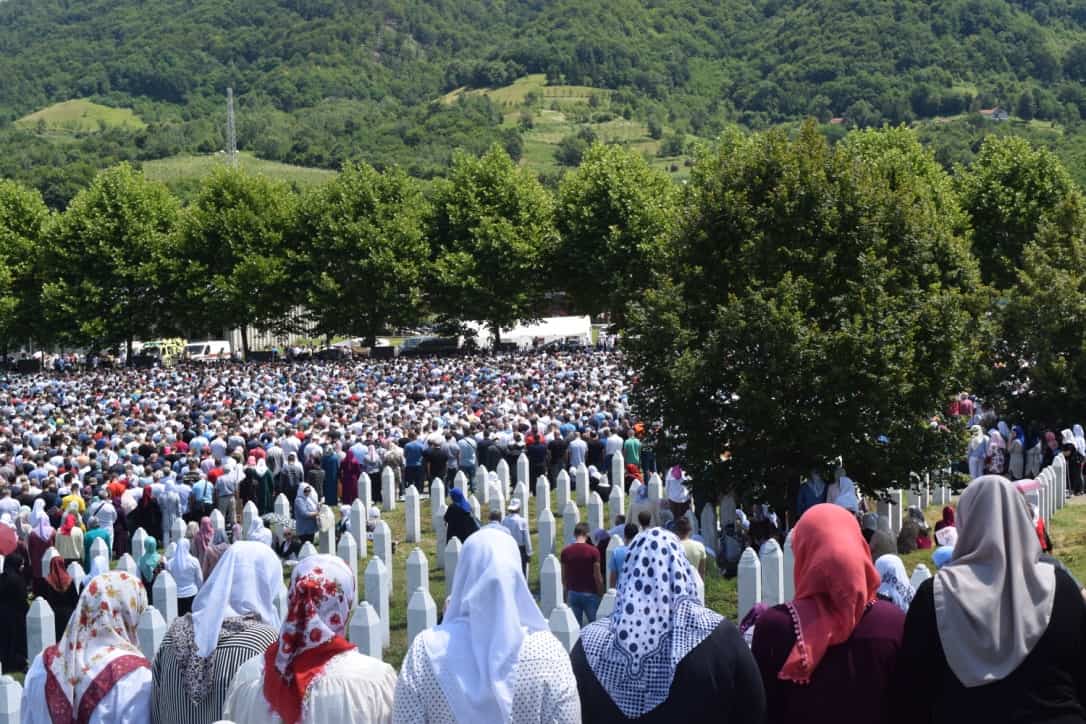Kate Horigan

Kate Horigan is a professor in the Folk Studies and Anthropology Department at Western Kentucky University. She received her MA in English from Tulane University and her PhD in English and Folklore from The Ohio State University. She specializes in narrative, memory and commemoration, ethnography of communication, and critical trauma theory. Horigan’s most recent publication is Consuming Katrina: Public Disaster and Personal Narrative. She has served as associate editor (2014–15, 2016–17) and co-editor (2015–16, 2018–20) of the Journal of American Folklore.

Kate Horigan in Bosnia in 2017, covered for a tour of Blagaj Tekija (Dervish house); photo courtesy of Kate Horigan.
What is your current job and how does it relate to or incorporate folklore?
I am Assistant Professor of Folk Studies at Western Kentucky University. I teach a wide range of folklore classes to graduate and undergraduate students, and especially help young folklorists in our Folk Studies MA program to find their footing in our field. My research is also grounded in folklore theory and ethnographic methods. I study communities that have been disrupted by disaster or conflict, and try to learn about how they draw on traditional resources—such as personal narrative and vernacular commemoration—to rebuild their social worlds.
What is a day-in-the-life like for you?
One of the things I love about my career is that my day-to-day changes frequently. During any given academic semester, I am developing new course content and meeting new students. For example, this past year I started teaching an undergrad class on “Folklore and the Media” and a grad class on “Folk Belief.” I’m currently serving as co-editor (with editor-in-chief Ann K. Ferrell) of the Journal of American Folklore, so I’m spending a lot of time reviewing new submissions and working with authors to revise their manuscripts. Summers are typically for research and writing, but that changes over time too: four years ago in August, I was traveling to New Orleans for the 10th anniversary of Hurricane Katrina, and this past July, I headed to Bosnia for the annual commemoration of the 1995 Srebrenica genocide. One consistent thread through my daily routine though is there is always lots of reading!
How did you get to where you are today? What were some important steps in your journey?
I’m so happy I ended up at Western Kentucky! Like many folklorists, I stumbled into our field. I was an English major, researching oral histories of Katrina survivors when I lived in New Orleans (2001–2008), first as a student at Tulane University, then as an Instructor at Delgado Community College. Shortly after beginning my PhD in the English Department at Ohio State, Amy Shuman showed me the light of folklore. The welcoming environment of the Center for Folklore Studies at OSU and the active Folklore Student Association were a big part of the draw of the field for me, as was AFS’ inclusion of students. After graduating from OSU (2013), I spent a year teaching in the Department of Folklore & Ethnomusicology at Indiana University. That was an excellent professional start for me; the other faculty were very supportive of me as a Visiting Lecturer, and I was able to teach in my areas of specialty and participate in department life. I started at WKU in fall of 2014, and despite my showing up to my first day of work six months pregnant, my colleagues here have been amazing ever since.
What goals drive your work? What kind of impacts do you strive to achieve?
I hope to inspire people to notice and appreciate the rich cultural traditions of their own and others’ communities. In teaching, I try to get students to think critically about how culture can be a means to better connect people to one another and to social justice. In my research, I aim ultimately to improve how we respond to and remember large-scale catastrophic events. Right now I’m at the stage of understanding how those processes work and identifying how/where folklorists can advocate for improvement.
How does your work impact your community?
I think my teaching makes people feel more ownership over their own cultural traditions—which is empowering especially for first generation students—and more curiosity and openness towards others. So far, I hope my research and service work has made marginalized groups feel as though they are being represented on their own terms. One example of this is writing (in my book Consuming Katrina) about interviews given by Katrina survivors. Another example is working with colleagues at WKU and community partners to create the exhibit “A Culture Carried: Bosnians in Bowling Green” (2017–19) at the Kentucky Museum (https://kfpbosniaproject.org/). This exhibit was created in part in response to the hope of Bosnian Americans in Bowling Green that their experiences as refugees and their traditions could be documented and shared with the larger community.
What sorts of issues are most pressing for your community and how do your personal or professional endeavors intersect with these issues?
In both communities where I have done long-term work—among Katrina survivors and Bosnian refugees—there is a common imperative to tell a story that helps that community both survive what they have endured and build a viable future for themselves. This might happen on a more personal level of recollection, or through a mass-mediated narratives, or with memorialization of past events. In any case, I see my role as understanding how and why that story is being told, and when possible and appropriate, amplifying it in the service of social justice (more equitable disaster recovery, for example, or more inclusive memorialization).
What do you like best about where you live and/or the communities you work with?
In Bowling Green where I teach, I love the vibrant community of folklorists—my colleagues in the Folk Studies Program, the Kentucky Folklife Program, and the Kentucky Museum, as well as our awesome students and alumni who are working in all kinds of folklore-related jobs. In both New Orleans and Bosnia where I’ve traveled for research, I’m always impressed by people’s creativity, even in the worst of times. In my current work with Bosnians, I’ve also been overwhelmed by the generosity of community members—especially in sharing their time and cultural expertise.
What do you most wish outsiders knew about your community?
In terms of the Bowling Green community, I wish people didn’t get it mixed up with Bowling Green, Ohio….Seriously, though, I think Kentucky tends to get a bad rap without people knowing much about it, and there are a lot of wonderful things to know. Because of WKU’s legacy of over a century of folklore research, I’ve learned a lot in this job about the rich and dynamic traditions of the region, and I am glad that I get to play a role in continuing to document and share them. Regarding other communities with whom I work closely—in New Orleans and in Bosnia—it’s important to know that these are thriving communities in many ways, but they are also still very much struggling with ruptures that might seem long-past to outsiders.

Photo on left: Visiting the special collection “Besieged Sarajevo” at the Historical Museum of Bosnia and Herzegovina; photo courtesy of Kate Horigan.
Share a bit about one or two of your projects (past, present, or future) that you are most excited about.
I recently returned from an exciting research trip to Bosnia in July 2019. Bosnia is an incredibly beautiful country, and there are such rich and complicated layers of history in every corner of it. I’ve included a few photos documenting this trip to share some of what I did and learned.
What kinds of things do you do with your personal time? Activities, endeavors, commitments that you pursue when you’re not on the job?
I have two young kids, so I don’t have much “personal” time! I enjoy things like reading fiction, the outdoors, photography, and live music. These days those interests have been adapted: reading “Frog & Toad” stories, bubbles in the backyard, Instagramming baby pictures, and singing “Wheels on the Bus.” My daughters are 4 and 1, and they each attended an AFS annual meeting as infants.

Photo on right: A group of Muslim Bosniak women pray together at the annual memorial of the 1995 genocide in Srebrenica, Bosnia; photo courtesy of Kate Horigan.
How did you discover folklore and what do you like best about it? Why did you stick with it?
I came into folklore through my interest in personal narratives, and I still love hearing, studying, and writing about them. I also love that folklore provides so many ways for interests to evolve—for example, I now study material culture and rituals related to commemoration too, which is not something I would have anticipated in my English-major days. But the main thing that keeps me in this line of work is my relationships with people, whether that is a graduate student who I get to work with, a colleague who I collaborate on a project with, or an interviewee who is willing to tell me about their life experiences over a cup of coffee.
Anything else we failed to ask that you want to share?
WKU is currently accepting applications to our Master of Arts in Folk Studies program!
We sometimes make mistakes, and we are happy to correct any errors that you may come across on our site. If you find an error, please let us know using the “submit a correction” link.